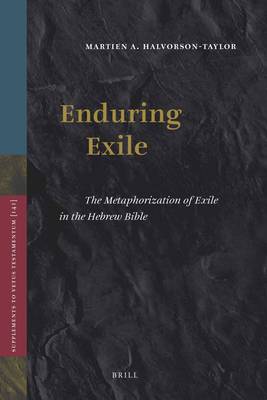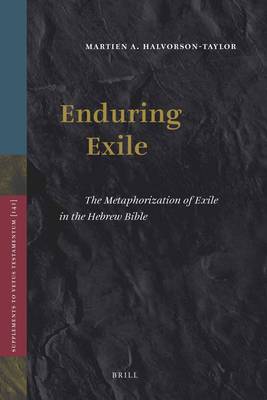
- Afhalen na 1 uur in een winkel met voorraad
- Gratis thuislevering in België vanaf € 30
- Ruim aanbod met 7 miljoen producten
- Afhalen na 1 uur in een winkel met voorraad
- Gratis thuislevering in België vanaf € 30
- Ruim aanbod met 7 miljoen producten
Zoeken
€ 224,45
+ 448 punten
Omschrijving
During the Second Temple period, the Babylonian exile came to signify not only the deportations and forced migrations of the sixth century B.C.E., but also a variety of other alienations. These alienations included political disenfranchisement, dissatisfaction with the status quo, and an existential alienation from God. Enduring Exile charts the transformation of exile from a historically bound and geographically constrained concept into a symbol for physical, mental, and spiritual distress. Beginning with preexilic materials, Halvorson-Taylor locates antecedents for the metaphorization of exile in the articulation of exile as treaty curse; continuing through the early postexilic period, she recovers an evolving concept of exile within the intricate redaction of Jeremiah's Book of Consolation (Jeremiah 30-31), Second and Third Isaiah (Isaiah 40-66), and First Zechariah (Zechariah 1-8). The formation of these works illustrates the thought, description, and exegesis that fostered the use of exile as a metaphor for problems that could not be resolved by a return to the land-- and gave rise to a powerful trope within Judaism and Christianity: the motif of the "enduring exile."
Specificaties
Betrokkenen
- Auteur(s):
- Uitgeverij:
Inhoud
- Aantal bladzijden:
- 244
- Taal:
- Engels
- Reeks:
- Reeksnummer:
- nr. 141
Eigenschappen
- Productcode (EAN):
- 9789004160972
- Verschijningsdatum:
- 17/12/2010
- Uitvoering:
- Hardcover
- Formaat:
- Genaaid
- Afmetingen:
- 168 mm x 246 mm
- Gewicht:
- 566 g

Alleen bij Standaard Boekhandel
+ 448 punten op je klantenkaart van Standaard Boekhandel
Beoordelingen
We publiceren alleen reviews die voldoen aan de voorwaarden voor reviews. Bekijk onze voorwaarden voor reviews.











